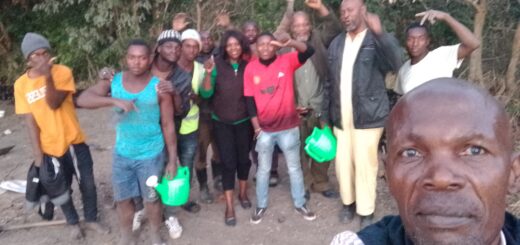New ICRISAT-FAO Partnership to Support Saudi Arabia’s Quest for Boosting Cereal Production
Notice: Undefined index: catFilterList in /home/zambi/public_html/wp-content/plugins/wp-likes/api.php on line 243

New ICRISAT-FAO Partnership to Support Saudi Arabia’s Quest for Boosting Cereal Production
New ICRISAT-FAO Partnership to Support Saudi Arabia’s Quest for Boosting Cereal Production
Media Release
Despite only 3% of the agricultural land being irrigated by rainfall, the Kingdom of Saudi Arabia (KSA) has overcome tremendous obstacles in recent years to convert 0.8 million hectares of agricultural land into productive fields.
Building on this success, the joint initiative between ICRISAT, FAO, and the Saudi Ministry of Environment, Water, and Agriculture, will focus on increasing the productivity of three vital dryland crops—sorghum, pearl millet, and sesame—by up to 20% in the regions of Mecca, Jazan, Aseer and Al-Baha.
Collectively these regions currently produce 170,000 tons of sorghum, 4,800 tons of pearl millet, and 4,000 tons of sesame across 70,000 hectares, with efficiency and yields to be expanded under the new initiative for smallholders in the KSA who have been cultivating these crops using traditional agricultural practices.
The project will also establish five community seed banks with the support of ICRISAT’s Genebank to preserve local crop diversity while building the capacity of smallholder farmers, extension agents, and researchers in the region.
In addition, comprehensive support will be extended through the pioneering mobile crop advisory app ‘Plantix,’ which will be localized in Arabic, empowering farmers with essential guidance in addition to the development of new digital technologies to combat the challenges posed by pests and diseases.
Dr Ashok Kumar from ICRISAT and Coordinator of the Project, said that the Institute’s expertise would help in selecting the best crop varieties for the targeted regions.
“Our team has identified 15-20 varieties of rainfed cereals with good yields in Sudan, which has similar conditions to Saudi Arabia, and this knowledge will be used to streamline efforts and select the most suitable varieties for targeted regions,” said Dr Ashok Kumar.

Dr Ashok Kumar, ICRISAT, Coordinator of the Project, ‘Development of Rainfed Cereal Production in Saudi Arabia’
ICRISAT Director General, Dr Jacqueline Hughes applauded the collaboration and said the Institute was delighted to be sharing its fifty years of expertise in dryland agri-food systems with the Government of Saudi Arabia and the FAO to help the nation achieve greater self-sufficiency in food production.
“We understand the reliance of Saudi Arabia on imported cereal grains due to limited domestic production, however, by bridging the gap between international drylands expertise and local resources, we can bolster domestic production for enhanced food independence,” said Dr Hughes.

Dr Jacqueline Hughes, Director General, ICRISAT.
Dr Kakoli Ghosh, Chief Technical Advisor, FAO-Saudi Arabia, said that the disruption to the global food chain caused by the COVID-19 pandemic had drawn attention to the need for self-reliance in food grains.
“ICRISAT’s multi-disciplinary expertise in the drylands of Asia and Sub-Saharan Africa is highly valued and appreciated in the effort towards achieving sustainable rural development in Saudi Arabia,” said Dr Ghosh.
Dr Arvind Kumar, ICRISAT’s Deputy Director General of Research concluded that he looked forward to seeing the collaboration channel the full potential of scientific advances and innovations developed at ICRISAT to forge a new pathway for millet and sesame production in Saudi Arabia and hoped the project would segue into new areas in which ICRISAT could demonstrate its impact.
The 3-year project: ‘Development of Rainfed Cereal Production in Saudi Arabia’ is led by the International Crops Research for the Semi-Arid Tropics with support from the Ministry of Environment, Water, and Agriculture, Saudi Arabia, and the FAO Saudi Arabia.
Ramon PeacheyDirector Communications, ICRISAT
Priyanka ChawlaSenior Communications Specialist (Asia), ICRISAT
ABOUT THE INTERNATIONAL CROPS RESEARCH INSTITUTE FOR THE SEMI-ARID TROPICS
The International Crops Research Institute for the Semi-Arid Tropics (ICRISAT) is a pioneering, international non-profit scientific research for development organization, specializing in improving dryland farming and agri-food systems. The Institute was established as an international organization in 1972, by a Memorandum of Agreement between the Consultative Group on International Agricultural Research and the Government of India. ICRISAT works with global partners to develop innovative science-backed solutions to overcoming hunger, malnutrition, poverty, and environmental degradation on behalf of the 2.1 billion people who reside in the drylands of Asia, Sub-Saharan Africa, and beyond.
Our offices:
Asia: India (Headquarters – Hyderabad)
East and Southern Africa: Ethiopia, Kenya, Mozambique, Malawi, Zimbabwe
West and Central Africa: Mali, Niger, Nigeria
For all media inquiries, please email: info.comms@icrisat.org
The International Crops Research Institute for the Semi-Arid Tropics
Hyderabad, Telangana, India


















